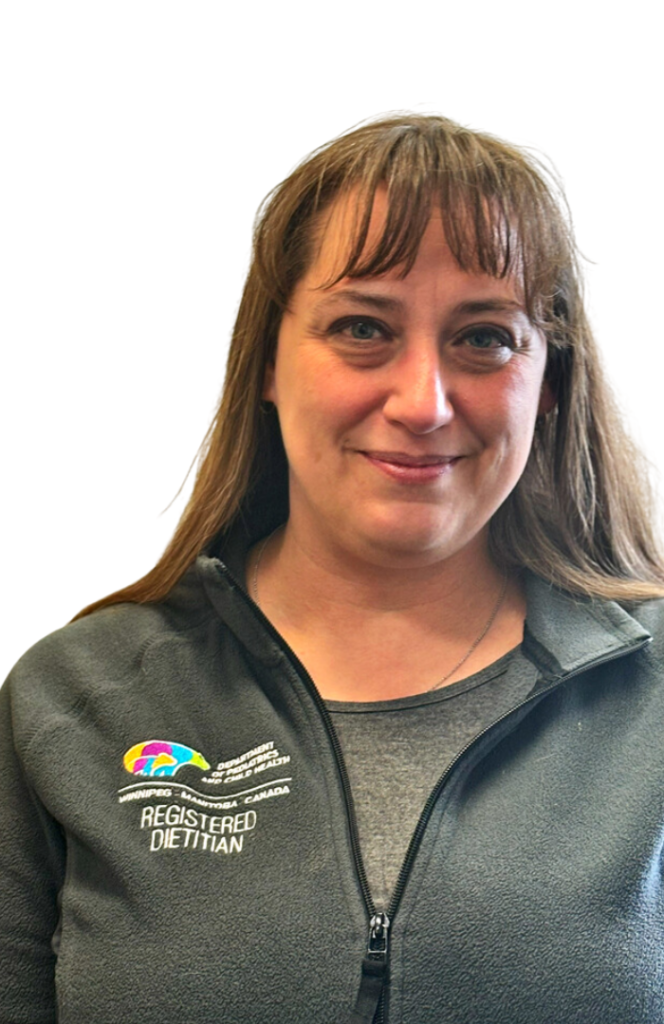In an age of proliferating online wellness influencers, food prep tip and life coaches, Registered Dietitians are in a whole other category.
Registered Dietitian Lisa W. says people still confuse her unique professional role with that of a menu planner.
As Manitoba’s only Registered Dietitian specialized in pediatric nephrology (working with children affected by kidney diseases), Lisa’s job is rooted in science, yet fueled by connections, empathy and a commitment to supporting children with complex health needs.
“I was taking an undergraduate science degree at the U of M, and considering a career in pharmacy,” said Lisa. “A friend invited me to sit in on a nutrition class, and the rest, as they say, is history. I applied immediately to the faculty of Human Ecology to become a Dietitian. I absolutely love what I do.”
Wilson graduated in 1999 and did an internship at the Misericordia Health Centre. Since 2003, she has been working at the Children’s Hospital as a Pediatric Dietitian. Her patients are children aged from birth through to 18, and they live with genetic and congenital conditions, or illnesses caused by infection, injury and more.
“The majority of my patients are children with kidney disease (stages 1 through 5), but I also work with patients with diabetes, cancer, metabolic disorders, and those needing special feeding care or menus after surgery, accidents, and injuries.”
“I like to tell the teenagers I’m working with: I’d rather be your partner in crime than the food police, so let’s talk it out and figure out how to adjust your menu and medicines to make up for special circumstances.”
– Lisa W., registered dietitian
Dietetics is an evidence-based practice which sees food as medicine. The Children’s Hospital Dietitian team, made up of less than five full-time equivalent positions, advocates for their patients and works closely with families.
“We work strategically with families to optimize their learning about nutrition and their access to healthy food. Nutritious food can be very difficult and costly to obtain, especially if you live up North. I am fortunate to be in a position to form great relationships with families and to get to know them well, often because I work with them for so long.”
Lisa has an outpatient load which can range anywhere from 35 to 80 patients, and she supports in-patient needs as well, navigating through units CK5 (where 80 to 90 per cent are children with cancer) and CK3 (surgery and medicine).
“We take all kinds of factors into account in providing patient care. We want to meet our families where they’re at and help them adopt good habits to reduce risk and promote health. We also keep in mind that there are significant cultural foods, everyone’s living circumstances and financial means differ, and every family has its own lifestyle. I tell people that all foods can fit as long as you’re honest with me, so we can adjust accordingly.”
Lisa says that working with teenagers is a lot of fun and she enjoys the spark and spunkiness many of her adolescent patients bring to the table.
“We all know that teenagers want to go with their friends for a slurpee after a baseball game and they’re going to eat snacks at a movie. If we tell them not to do it, they’re likely going to do it anyway, so we have to work with that. I’d rather be your partner in crime than the food police, so let’s talk it out and figure out how to adjust your menu and medicines to make up for special circumstances. Eating is an extremely social activity and we want to make sure people have connection and enjoyment – especially young people. We don’t want them to feel alienated or isolated.”
In her ‘spare time’, Lisa teaches a youth cooking class at her local community centre.
“The teaching started for me during the pandemic when we all seemed to be dealing with strange feelings. I was questioning where I fit in, if I could keep doing what I had been doing and if I could keep up the pace of working in the health-care system. Sometimes, when we’re forced to stop, only then do we realize just how tired we are. That’s what happened for me, I think. I’m still teaching the cooking class, and I like it, but I’m really quite busy. We’ll see how much longer I can sustain it!”
Lisa is a mom of three and a grandma, and she says working with children has been a gift.
“Of course, there is sadness and loss, and there are extremely difficult days, but there are also many wonderful, positive and rewarding moments. We get to see the amazing things that kids can do and the challenges they can overcome. I have accepted that I can’t do everything, but I can do some things to make a difference, and that makes this job worthwhile.”

